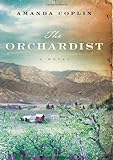 You belong to the earth, and the earth is hard.
You belong to the earth, and the earth is hard.
I read Amanda Coplin‘s [amazon asin=006218850X&text=The Orchardist] as part of its TLC Book Tour.
Set at the turn of the twentieth century in Washington State, when the west was still a bit untamed, forbidding, and isolated from the rest of the country, The Orchardist is a novel about human connections and the interwoven nature of humanity. The orchardist of the title is William Talmadge, who lost his sister when she mysteriously disappeared and whose disappearance still haunts him. Alone in his orchards, Talmadge is a solitary man with few companions until one day two bedraggled and pregnant teenage girls show up in his orchard. Talmadge leaves food for the girls and tries to care for them. They are mistrustful of him and keep their distance. Talmadge discovers someone is looking for the girls, and after he makes a visit to the man’s house and discovers what might have prompted the girls to flee, he resolves to protect them in whatever way he can, but he quickly discovers through yet a new tragedy, that it is not in his power to protect, and he has to reconcile his feelings about this fresh new tragedy with the tragedies of his past.
I have an interesting connection to this book in that my own ancestors were apple orchardists for several generations in the twentieth century. In fact, my father is the first generation of his family not to be an orchardist. My own family lived in the Yakima Valley, which is south of the area of Washington where Coplin’s novel is set. Coplin is a Washington native, and I found the setting she described familiar. I have never actually visited Washington State myself, but I have heard it described by my father and step-grandmother. My step-grandmother frequently mentioned canning ‘cots (apricots) in her letters, and my father described the ladders in apple orchards that workers climbed. Coplin’s descriptions are lush—they place the reader in the scene and reminded me a little bit of Louise Erdrich’s novel [amazon asin=0060515139&text=The Plague of Doves] in the connection of the characters to the land and the interwoven community connected through tragedy. Coplin doesn’t use quotation marks when characters speak, which strikes me as an interesting technique in that it takes the characters out of the story a little bit. I didn’t notice the technique books that read more like journals or memoirs, but in fiction, I have to admit I’m not much of a fan; lack of quotation marks is one reason I don’t enjoy reading Cormac McCarthy’s books. However, I should say that I didn’t actually find the technique irritating in Coplin’s book, and I usually do. The Orchardist is an intriguing read and reminded me in parts of [amazon asin=0142437808&text=Ethan Frome], but I think that is because Talmadge reminded me of Ethan Frome. The two books are not that similar in plot or structure otherwise. Book clubs might find this selection an interesting novel to discuss.
TLC Book Tour for The Orchardist:
- Tuesday, August 21st: Cold Read
- Wednesday, August 22nd: Paperspines
- Thursday, August 23rd: nomadreader
- Monday, August 27th: Man of La Book
- Tuesday, August 28th: West Metro Mommy
- Thursday, August 30th: girlichef
- Monday, September 3rd: A Room of One’s Own
- Wednesday, September 5th: The Lost Entwife
- Thursday, September 6th: Much Madness is Divinest Sense
- Monday, September 10th: Stiletto Storytime
- Tuesday, September 11th: Write Meg
- Wednesday, September 12th: The Feminist Texican [Reads]
- Thursday, September 13th: Oh! Paper Pages
- Thursday, September 20th: Shall Write
- Friday, September 21st: The Written World
Ooh, how cool that your own family history includes orchardists! It must have been pretty neat to read descriptions of things you've heard about all your life.
Thanks for being on the tour!